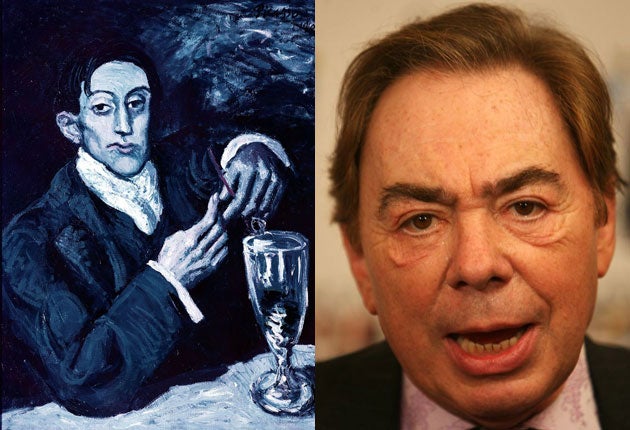Lloyd Webber charity strikes secret deal over £30m Picasso
Jewish banker said Nazis had made him sell the painting

Your support helps us to tell the story
From reproductive rights to climate change to Big Tech, The Independent is on the ground when the story is developing. Whether it's investigating the financials of Elon Musk's pro-Trump PAC or producing our latest documentary, 'The A Word', which shines a light on the American women fighting for reproductive rights, we know how important it is to parse out the facts from the messaging.
At such a critical moment in US history, we need reporters on the ground. Your donation allows us to keep sending journalists to speak to both sides of the story.
The Independent is trusted by Americans across the entire political spectrum. And unlike many other quality news outlets, we choose not to lock Americans out of our reporting and analysis with paywalls. We believe quality journalism should be available to everyone, paid for by those who can afford it.
Your support makes all the difference.A wealthy art charity set up by music impresario Andrew Lloyd Webber has reached a confidential settlement over the ownership of a £30m Picasso portrait with the heirs of a Jewish banker who claimed that he had been forced to sell the painting during the 1930s by the Nazis.
The Andrew Lloyd Webber Art Foundation, established by the composer in 1992 to expand public knowledge of the arts and lend important works to galleries and museums, was forced to withdraw the 1903 Picasso painting The Absinthe Drinker from a planned auction in New York three years ago, after descendants of Paul Mendelssohn Bartholdy lodged a claim that it had been sold under duress to a Berlin art dealer in 1934.
The foundation, which is funded by Lord Lloyd Webber and paid £18m at auction for the Picasso in 1995, dismissed the claim at the time as "utterly spurious, without legal or factual substance". It said the portrait, which has since been loaned to the National Gallery and the Royal Academy, had been bought in good faith from its previous owner – one of at least four since the painting was sold in 1934.
Two years ago, a New York court seemed to have settled the matter in favour of the Berkshire-based foundation, when it ruled that Professor Julius Schoeps, a German academic and the great-nephew of Mr Mendelssohn Bartholdy who led the claim on behalf of the family, had not established that he was a "rightful heir" to the painting.
But a Washington-based lawyer announced yesterday that a settlement had been reached, which will see Lord Lloyd Webber's charity retain ownership of the Picasso.
Both sides told The Independent that the details of the deal were confidential, and refused to confirm whether the British foundation, which has funds worth £32m, had made a payment to the heirs of Mr Mendelssohn Bartholdy, who was the head of one of Germany's most powerful banking families and the owner of an extensive art collection.
In February last year, Professor Schoeps, who along with his great-uncle is a descendant of the composer Felix Mendelssohn, and other heirs reached a cash settlement with the Museum of Modern Art and the Guggenheim Foundation, both in New York, over two other Picassos claimed to have been in the family's collection.
The judge in that case, Jed Rakoff, criticised the secrecy surrounding the settlement, saying that while the two American museums had agreed to disclose the sums paid for the Picassos, the descendants of Mr Mendelssohn Bartholdy had remained opposed "for reasons wholly unexplained and seemingly no more compelling that concealing the amount of money going into their pockets".
John Byrne, the American lawyer representing the heirs, said yesterday that Judge Rakoff had also ruled that the family had established "competent evidence that Paul Mendelssohn Bartholdy never intended to transfer any of his paintings, and that he was forced to transfer them only because of threats and economic pressure by the Nazi government."
In a statement, the Andrew Lloyd Webber Art Foundation said: "The trustees are pleased to announce that Professor Julius Schoeps and all other heirs of Paul Mendelssohn Bartholdy have settled and relinquished any and all claims of title in the painting, The Absinthe Drinker."
The charity, which in its last annual accounts said it was "greatly saddened" that the ongoing legal action meant that it could neither exhibit nor sell the portrait to further its work, could not immediately say whether it still planned to put the painting up for auction.
The portrait is one of thousands of artworks owned by Jewish families that have been the subject of claims that they were forcibly sold or looted by the Nazis. About 20,000 pieces of art stolen under the Third Reich remain unaccounted for.
The Absinthe Drinker, which shows a languid young man posing beside a glass of "la fée verte", was finished by Picasso during his so-called Blue Period and features the artist's close friend, Angel Fernandez de Soto.
Join our commenting forum
Join thought-provoking conversations, follow other Independent readers and see their replies
Comments